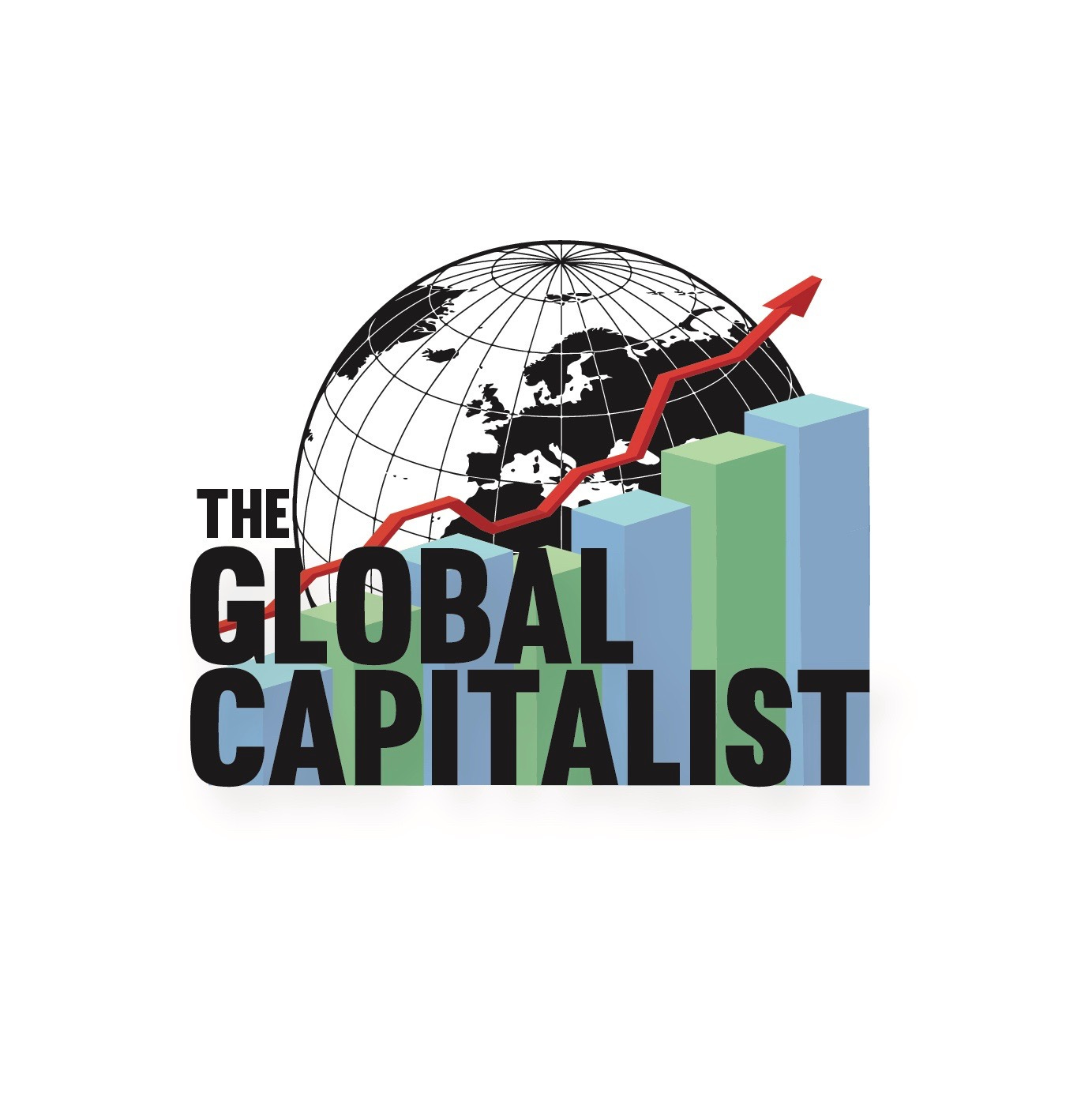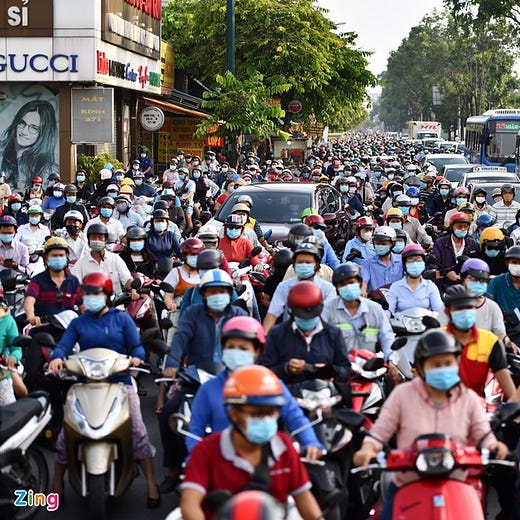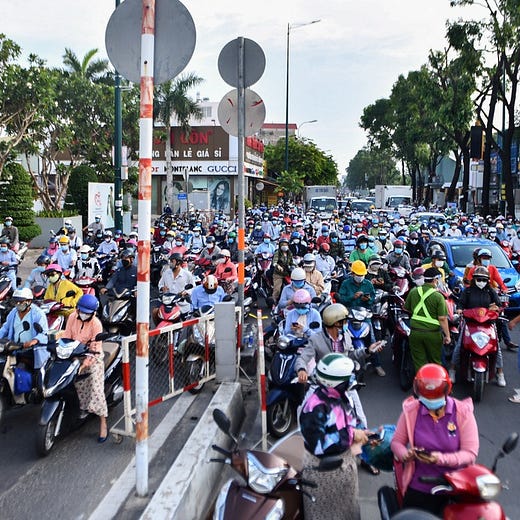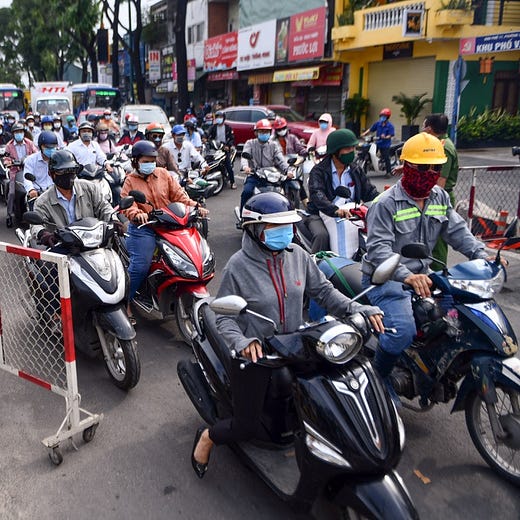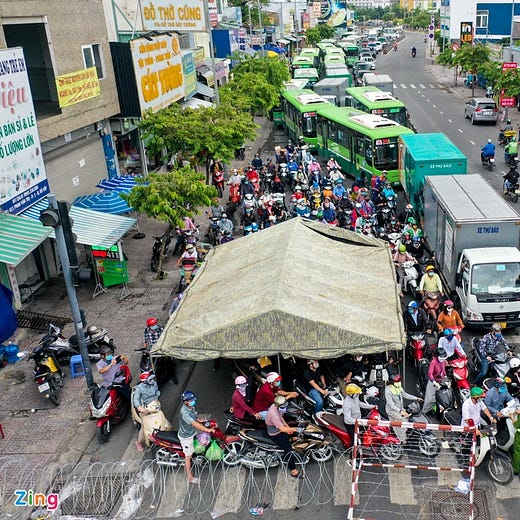This Week in Emerging Markets (Vol. IX)
News, data, and curated content from across the globe.
Welcome to This Week In Emerging Markets, a weekly wire for topics in, from, and about emerging markets.
Hey everyone — Sorry for no letter last week, I ended up taking an MDW break.
I’m finishing up class in a couple of weeks so I’m hoping to get back on a routine with long-form pieces. In the meantime, I always appreciate any advice or feedback on my writing.
I hope you all had a great short week.
— Tom
Friendly reminder that this is a free publication. Please consider subscribing below or sharing this post to support my work.
Trivia
Only 6 economies can boast an economy larger today than it was prior to the pandemic. Can you name them? Answer below.
FT: Work on a Bali beach? Indonesia to send civil servants to island
This is part of the government’s efforts to create demand so that hotels and restaurants in Bali can survive,” Odo Manuhutu, deputy for tourism and creative economy at the minister’s office, told reporters. “In line with the health ministry’s guidelines, Bali’s vaccination rate is currently the highest and fastest [among Indonesia’s provinces] . . . to make sure that Bali is safe to visit.”
——————————————
With 80 per cent of its economy dependent on tourism and related sectors, Bali reported the deepest contractions among Indonesia’s 34 provinces in 2020 and in the first quarter of this year — at 9.3 per cent and 9.85 per cent, respectively. Indonesia’s economy, meanwhile, shrank 2.07 per cent and 0.74 per cent in the two periods.
Karthik Sankaran: How I learned to stop worrying and (mostly) love the Euro.
Instead, I would characterize the ECB’s role in the Eurozone as acquiescence in fiscal dominance for single national governments, but with such acquiescence conditional upon commitment by the government to the broad political and economic project of the EU. The level of such commitment is gauged by the ECB, key national governments (essentially Germany and France), the European Commission and is further tempered by consideration of the size, systemic importance and “oppositional” or “cooperative” character of the government in question.
—————————
And the important lesson here is that while the argument that the Euro was/is a political project rather than an economic one has been deployed by Euroskeptics as a reason for its projected failure, it is precisely that the fact the Euro is a political rather than an economic project that has kept it alive through extraordinary and once unthinkable interventions every time it was given up for dead.
—————————
Does this mean all is well? Obviously not. The 2010s have clearly been a lost decade for the Eurozone periphery, with terrible human costs. But the answer to this is not to exit the Eurozone and lose the shelter and support provided by the ECB, a level of support that is extremely unlikely to be matched in terms of market credibility were it to be provided by a post-exit successor NCB. Rather it is to use the umbrella provided by a full-service ECB to expand the ability of both the Union as a collective and of single Eurozone members to engage in proactive fiscal policy for the purposes of both countercyclical stimulus and the enhancement of structural growth trends.
WSJ: Macron Acknowledges France’s ‘Terrible Responsibility’ for Rwandan Genocide
“France has political responsibility in Rwanda, it has a duty to recognize the share of the suffering it inflicted on the Rwandan people,” Mr. Macron said, shortly after laying a wreath at the memorial. “I have come to recognize our responsibilities; only those who survived can perhaps forgive.”
————————————
On Thursday, Mr. Kagame hailed Mr. Macron.
“This visit is about the future, not the past,” he said. “This is an act of tremendous courage.”
Pekingnology: "Rapid appreciation of the RMB is not sustainable"
Q: Recently, the spot exchange rate of RMB against USD rose above 6.4. How do you think about the recent strengthening of RMB against USD and its reasons?
A: The RMB exchange rate has risen and fallen, and two-way floating has become the norm. Since the second half of last year, the RMB spot exchange rate has appreciated by 8.2% against the USD and has stabilized at the end of last year, with the RMB fluctuating around 6.5 against the USD.
——————————————
At the same time, China has become the world's number one investment destination. In recent years, the spread of interest rates between China and the United States has widened, once as high as 2 percentage points or more. Data show that foreign capital increased its holdings of domestic bonds by $186.1 billion in 2020, and direct investment (FDI) inflows into China bucked the trend to reach $212 billion, up 14%. The significant increase in foreign holdings of RMB assets has also pushed up the RMB exchange rate.
The strong performance of the RMB exchange rate in the second half of last year should be said to have already fully reflected these favorable factors; since the end of last year, without new favorable factors, the RMB exchange rate performance has been generally stable. However, recently, misled by some inappropriate remarks, the RMB has experienced some overshooting against the USD.
This year, the dollar index has risen and then depreciated, falling by 2.2% in the last month and a half, while the euro and the yen appreciated by 2.3% and depreciated by 0.4% respectively against the dollar, but the RMB appreciated by 2.9%. Especially recently, the dollar index has been around a relatively low level of 90.00, the U.S. economy is recovering faster than Europe and Japan, and the possibility of the dollar index going down again is smaller. According to the laws of the market, the exchange rate of RMB against USD should also be relatively stable, but the recent record high of RMB against USD shows that there is overshooting in the market.
Twitter
Bloomberg Green: G-7 Set to Back Green Rival to China’s Belt and Road Program
A G-7-backed plan to rival China’s infrastructure strategy was initially pushed by U.S. president Joe Biden, and has featured in technical discussions between diplomats preparing next week’s meeting in Cornwall, England, one of the people said.
—————————————
Germany, France and Italy are keen for it to support activities in Africa, while the U.S. is pushing for action in Latin America and Asia. Japan argues for more focus on the Indo-Pacific region. But all nations broadly agree on the need for a more transparent alternative to the Chinese program, the person added.
Visual Capitalist: The Median Age of the Population on Every Continent
While it is not surprising that Monaco – a small and wealthy city-state that sits on the French Riviera with a population of just 40,000 people – is the oldest country in the world, it seems that age could be a real challenge for the major economies that also make this list.
Germany, Italy, and Japan have some of the largest economies in the world with a combined nominal GDP equal to 12.2% of global output. At the same time, they are also three of the oldest countries right now, and they are each projected to hit a median age of 50 years or higher by the year 2050.
On the other end of the spectrum, there are more than 30 countries that have median ages under 20 years, with most of them existing in Africa or the Middle East. One exception to this is Timor-Leste, a small country bordering Indonesia, which has a median age of 18.9 years.
The Grumpy Economist: Brazilian Inflation
In February 1994, the government launched its last stabilization plan, the Real Plan, which would finally put an end to the hyperinflation. The plan that conquered Brazilian inflation did not have the blessing of the IMF, an always troubled relationship in the previous decades. The plan’s concepts were different from the previous ones: it aimed to reduce deficits, modernize firms, and reduce the distortions that arose from previous price freezes...
Its first stage...[I]t included an increase in existing tax rates, such as income tax, the creation of new taxes, such as the tax on financial intermediation, and the renegotiation of subnational government debt in an attempt to control the deficits of subnational governments... a way to suspend part of the earmarked revenues of states and municipalities, providing more flexibility in the government budget.
On the monetary side, a clearly stated intention to limit issuances of the new currency led to the adoption of a high interest rate policy and high reserve requirement ratios (100 percent reserve requirements on new deposits after July 1, 1994). In addition, the plan included changes in the institutional framework in which the central bank operated...
The Africa Report: Palm oil, timber, cocoa: What to expect from Africa in 2021
CyclOpe expects that commodity prices will continue to rise in 2021, particularly for all agricultural products: +26% for palm oil, +20% for coffee, +20% for maize, +11% for cotton, +5% for rice and +1% for cocoa.
———————————
The report also analyses the paradoxical bean market. The tug of war taking place between Côte d’Ivoire and Ghana – which was responsible for 62% of the world’s production between 2019 and 2020 – as well as multinational chocolate companies, seemed to benefit producers.
The Week Ahead:
Monday — 🇨🇴 Corpus Christi Day; 🇲🇾 Agong’s Birthday; 🇳🇿 Queen’s Birthday; 🇨🇭 Swiss Unemployment; 🇨🇭 Swiss, 🇷🇺 Russian CPI; 🇨🇳 Chinese, 🇯🇵 Japanese Trade Balance; 🇯🇵 Japanese GDP;
Tuesday — 🇩🇪 Germany, 🇦🇷 Argentina Industrial Production; 🇪🇺 E.U., 🇿🇦 South African GDP; 🇧🇷 Brazilian Retail Sales; 🇺🇸 U.S., Canadian Trade; 🇨🇳 Chinese CPI & PPI;
Wednesday — 🇩🇪 German Trade; 🇲🇽 Mexican, 🇧🇷 Brazilian, 🇺🇦 Ukrainian CPI; 🇨🇦 Bank of Canada & 🇵🇱 Bank of Poland Interest Rate Decision;
Thursday — 🇫🇷 French Payrolls; 🇩🇰 Danish, 🇸🇪 Swedish CPI; 🛢 OPEC Monthly Report; 🇪🇺 ECB Interest Rate Decision; 🇺🇸 U.S. CPI; 🇳🇿 New Zealand Retail Sales;
Friday — 🇬🇧 British Industrial Production; 🇪🇸 Spanish CPI; 🇷🇺 Russian Interest Rate Decision;
Saturday - 🇵🇭 Philippine Independence Day; 🇳🇬 Nigerian Democracy Day;
Trivia:
Australia, Chile, China, Lithuania, Romania and South Korea were the six economies to grow in 2020.


